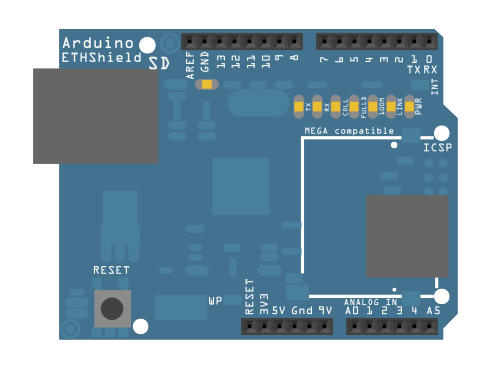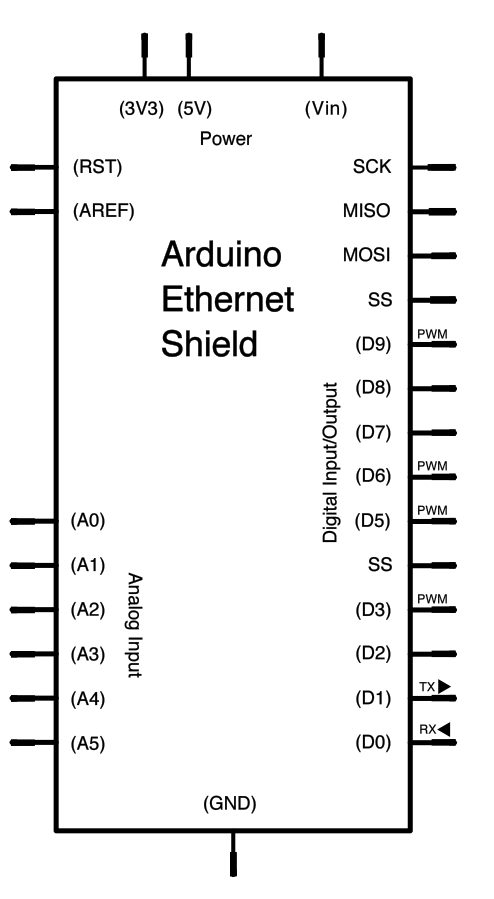AdvancedChat Server
A more sophisticated server that distributes any incoming messages to all connected clients except the one that is sending the message. To use, open a terminal window, Telnet to your devices IP address, and type away. Any incoming text will be sent to all connected clients (including the one typing). Additionally, you will be able to see the client's input in your serial monitor as well.
Hardware Required
- Arduino or Genuino Board
- Arduino Ethernet Shield
Circuit
The Ethernet shield allows you to connect a WizNet Ethernet controller to the Arduino or Genuino boards via the SPI bus. It uses pins 10, 11, 12, and 13 for the SPI connection to the WizNet. Later models of the Ethernet shield also have an SD Card on board. Digital pin 4 is used to control the slave select pin on the SD card.
The shield should be connected to a network with an ethernet cable. You will need to change the network settings in the program to correspond to your network.
image developed using Fritzing. For more circuit examples, see the Fritzing project page
In the above image, the Arduino or Genuino board would be stacked below the Ethernet shield.
Schematic
Code:
Please note: according to your hardware setup, you need to comment / uncomment the libraries at the beginning of the sketch. Use Ethernet.h with the Arduino Ethernet Shield or Ethernet2.h with the Arduino Ethernet Shield 2 and Leonardo Ethernet.
Advanced Chat Server
A more advanced server that distributes any incoming messages
to all connected clients but the client the message comes from.
To use, telnet to your device's IP address and type.
You can see the client's input in the serial monitor as well.
Using an Arduino Wiznet Ethernet shield.
Circuit:
* Ethernet shield attached to pins 10, 11, 12, 13
created 18 Dec 2009
by David A. Mellis
modified 9 Apr 2012
by Tom Igoe
redesigned to make use of operator== 25 Nov 2013
by Norbert Truchsess
*/
#include <SPI.h>
#include <Ethernet.h>
// Enter a MAC address and IP address for your controller below.
// The IP address will be dependent on your local network.
// gateway and subnet are optional:
byte mac[] = {
0xDE, 0xAD, 0xBE, 0xEF, 0xFE, 0xED
};
IPAddress ip(192, 168, 1, 177);
IPAddress myDns(192, 168, 1, 1);
IPAddress gateway(192, 168, 1, 1);
IPAddress subnet(255, 255, 0, 0);
// telnet defaults to port 23
EthernetServer server(23);
EthernetClient clients[8];
void setup() {
// You can use Ethernet.init(pin) to configure the CS pin
//Ethernet.init(10); // Most Arduino shields
//Ethernet.init(5); // MKR ETH shield
//Ethernet.init(0); // Teensy 2.0
//Ethernet.init(20); // Teensy++ 2.0
//Ethernet.init(15); // ESP8266 with Adafruit Featherwing Ethernet
//Ethernet.init(33); // ESP32 with Adafruit Featherwing Ethernet
// initialize the Ethernet device
Ethernet.begin(mac, ip, myDns, gateway, subnet);
// Open serial communications and wait for port to open:
Serial.begin(9600);
while (!Serial) {
; // wait for serial port to connect. Needed for native USB port only
}
// Check for Ethernet hardware present
if (Ethernet.hardwareStatus() == EthernetNoHardware) {
Serial.println("Ethernet shield was not found. Sorry, can't run without hardware. :(");
while (true) {
delay(1); // do nothing, no point running without Ethernet hardware
}
}
if (Ethernet.linkStatus() == LinkOFF) {
Serial.println("Ethernet cable is not connected.");
}
// start listening for clients
server.begin();
Serial.print("Chat server address:");
Serial.println(Ethernet.localIP());
}
void loop() {
// check for any new client connecting, and say hello (before any incoming data)
EthernetClient newClient = server.accept();
if (newClient) {
for (byte i=0; i < 8; i++) {
if (!clients[i]) {
Serial.print("We have a new client #");
Serial.println(i);
newClient.print("Hello, client number: ");
newClient.println(i);
// Once we "accept", the client is no longer tracked by EthernetServer
// so we must store it into our list of clients
clients[i] = newClient;
break;
}
}
}
// check for incoming data from all clients
for (byte i=0; i < 8; i++) {
if (clients[i] && clients[i].available() > 0) {
// read bytes from a client
byte buffer[80];
int count = clients[i].read(buffer, 80);
// write the bytes to all other connected clients
for (byte j=0; j < 8; j++) {
if (j != i && clients[j].connected()) {
clients[j].write(buffer, count);
}
}
}
}
// stop any clients which disconnect
for (byte i=0; i < 8; i++) {
if (clients[i] && !clients[i].connected()) {
Serial.print("disconnect client #");
Serial.println(i);
clients[i].stop();
}
}
}
See also
- Arduino Ethernet Shield – Product description.
- Getting started with the Ethernet Shield – Get everything set up in minutes.
- Ethernet library – Your reference for the Ethernet Library.
- ChatServer - A simple server that distributes any incoming messages to all connected clients.
- WebClient – Query the web and get the answer through the serial monitor
- WebClientRepeating - How to make repeated HTTP requests using the Ethernet shield.
- WebServer - A simple web server that shows the value of the analog input.
- DhcpAddressPrinter – Get a DHCP address and print it on serial monitor.
- DhcpChatServer – Connect to a Telnet server and print on serial monitor all the received messages; uses DHCP.
- TelnetClient - Connect to a Telnet server and print on serial monitor all the received messages
- BarometricPressureWebServer – Post data read from a pressure sensor using SPI.
- UDPSendReceiveString - Send and receive text strings via the UDP protocol (Universal Datagram Packet).
- UdpNtpClient - query a Network Time Protocol (NTP) server and get the information through serial monitor.
Last revision 2018/08/23 by SM


